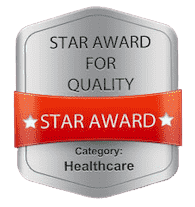What Causes Varicose Veins? is a very common question we are asked by our patients who visit us to skip surgery for varicose veins and instead opt for our specially formulated Homeopathy treatment for varicose veins. We assure our patients, whatever caused varicose veins, we have a complete treatment of varicose veins without the need for surgery. So can you be eligible for our treatment? Visit early or chat with us for an evaluation to understand more about our speciality treatment for varicose veins without surgery.
What Are Varicose Veins?

Varicose veins affect up to 45 percent of all men at one point during their lives. Unfortunately, varicose veins can be a sign of an issue affecting the cardiovascular system in both men and women. They look aesthetically unappealing but may eventually lead to discoloration of the skin, bleeding, abnormal leg sensations, skin ulcers or other serious issues. It’s possible a varicose vein in a man could eventually lead to a life-threatening complication.
Varicose veins, or varicosities, are large, “rope-like” veins that appear near the surface of the skin. They are often one-quarter inch or larger in diameter and most commonly found in the feet and legs. They very rarely cause symptoms, but may cause burning, muscle cramping, skin ulcers, or pain. Varicose veins may lead to more serious problems such as blood clots.
What Causes Varicose Veins?
A disease known as superficial venous insufficiency is the root cause of varicose veins. Ordinarily, tiny valves in your veins open to let blood flow to the heart before closing. This causes a one-way street for your blood and prevents any backflow. For those suffering from venous insufficiency, those valves are broken, which lets blood clot in the veins. This leads to an increase in pressure and makes the veins seem like they are bulging outwards, while also causing pain and swelling.
Approximately half of the population has some form of venous disease. Varicose veins affect about one out of two people age 50 and older, and 15-25% of all adults.
Risk factors for varicose veins include pregnancy, advanced age, and standing on your feet or sitting for long periods of time. Nurses, flight attendants, hairdressers, and others in occupations that are frequently on their feet may be more susceptible to varicose veins. Obesity also increases your risk for varicose veins as does being female. Hormonal changes may be responsible for the higher risk in women.
Varicose veins may be hereditary, so if an immediate family member has them, you may be more likely to develop varicose veins.
What Is the Real Cause Varicose Veins?
They’re both caused by the same thing, which is called venous hypertension, chronic venous insufficiency or venous reflux disease. Those three terms are used interchangeably, but they all basically mean the same thing. It’s increased pressure within the vein because of a failure of what’s called the venous valvular system. So normally you have to have a way of getting blood, against gravity, out of your legs and back to your heart.
The way that works is every time you take a step, the calf muscles contract, and that squeezes on the veins in your leg and pumps the blood out of your leg back to your heart. When you relax, gravity wants to pull the blood back into your leg. To prevent that from happening, in normal veins you have a valve that looks like a little triangle. Every time you take a step, the valve pops open, the blood exits the leg, and then when gravity wants to pull the blood back in the leg, the valve snaps shut.
For various reasons like family history, weight, having jobs where you sit or stand for long periods of time, these valves stop working, and that allows gravity to continuously pull the blood back into the leg. This causes pressure on all the superficial veins, which causes them to dilate over time and grow larger.
What Are The Symptoms Of Varicose Veins?
Although varicose veins are usually visible, and thus easy to diagnose, at times they may also infect interior veins in your legs. Many people with varicose veins say they feel an ache or cramp, that their legs feel heavy or lead-like, or that there is a tingling or burning sensation in their legs. Varicose veins may also cause swelling, throbbing, and are tender if touched. Although they are usually harmless, the disease may progress and cause more serious health problems, including:
- Blood clots
- Skin ulcers
- Bleeding
If left untreated, some patients can progress to more serious forms of venous disease, such as lypodermatosclerosis, which is a thickening of the skin. In very severe cases it can cause ulcerations, so you can actually get a wound because of the pressure on the skin. Most patients don’t experience that. What they experience are things like aching, burning, or swelling of the legs, and their legs feel tired at the end of the day.
What Are Risk Factors For Varicose Veins?
- Genetics: A family history of vein disease, spider veins and varicose veins makes it much more likely that you will develop this condition. If your mother and father both have vein disease, there is a 90% chance you will develop vein disease yourself.
- Female Gender: Men and Women are both at risk of developing varicose veins, but women are almost twice as likely to be diagnosed with vein disease.
- Age: Vein disease is uncommon before the age of 30, and your risk increases over time
- Pregnancy: Due to high circulating hormone levels, varicose veins and spider veins may increase over time.
- Weight Gain: Excess pounds put pressure on veins and makes it more likely you will develop spider veins.
How To Prevent Varicose Veins
Some of the things that cause vein disease and varicose veins are non-modifiable, meaning you cannot avoid them. You cannot change your genetic makeup and you cannot change your biological gender. You can, however, do the following:
1. Maintain a healthy weight: Excess pounds put pressure on valves in the underlying veins
2. Exercise regularly: Exercising squeezes the muscles in the calf, which helps push blood up to the heart even if the valves aren’t functioning as well.
3. Avoid high heels: There is no firm evidence that wearing high heels or crossing your legs causes varicose veins, but both may lead to compression on the veins and decreased activity of the calf muscles, theoretically causing varicose veins.
4. Avoid prolonged sitting or standing: inactivity can lead to decreased circulation and more blood pooling in the legs. Try to walk at least a few minutes every hour.
5. Consider an evaluation for Venous Insufficiency: Monitor yourself for symptoms of vein disease. If you have underlying venous insufficiency, it’s more likely that your varicose veins will get worse.
When Should You Visit A Welling Homeopathy Clinic?
If you have signs or symptoms of significant disease, including:
- Heaviness
- Aching in your legs
- Leg fatigue
- Cramping
- Swelling in the feet or ankles
- Varicose Veins
- Spider veins
Typically, symptoms due to venous insufficiency are worse at the end of the day especially a day spent sitting or standing. Symptoms tend to improve with exercise and leg elevation, and symptoms are usually worse with hot weather.
How Do You Treat Varicose Veins?
We treat varicose veins with our specially formulate Homeopathy treatment. The treatment is developed at our research department with veteran Homeopaths with combined experience of more than 100 years. The treatment has helped more than 10,500 patients till December 2019.
Visit a Welling Clinic to know more about our Homeopathy treatment for Varicose Veins or to know What Causes Varicose Veins?



